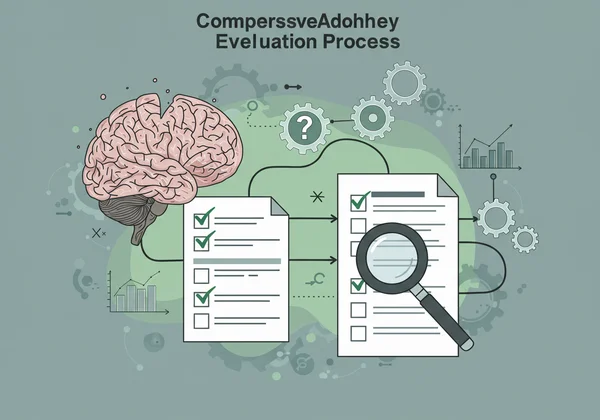How to Talk to Your Doctor About Your ADHD Assessment: A Step-by-Step Guide
October 11, 2025 | By Genevieve Hale
Feeling overwhelmed or unsure about discussing potential ADHD with your doctor after an online screening? You've taken a significant first step toward understanding your mind, and it's completely normal to wonder what comes next. Navigating the path to understanding ADHD can feel overwhelming, but you're not alone. This guide provides actionable steps, conversation starters, and essential information to help you confidently approach your doctor about ADHD. If you've been asking yourself, How to get an ADHD assessment?, this guide will help you navigate your journey to a professional diagnosis with confidence. Taking an online ADHD screening is a proactive start, and now it's time to prepare for a productive conversation.

Preparing for Your Doctor's ADHD Discussion
Preparation is the key to transforming anxiety into empowerment. Walking into your appointment with organized thoughts and clear examples will help both you and your doctor have a more effective discussion. This process isn't about proving a diagnosis; it's about providing a clear picture of your life experience.
Understanding Your Online ADHD Screening Results
Your results from an online tool are a valuable starting point. Think of the report not as a final verdict, but as a structured summary of your experiences. It highlights patterns and challenges that may be consistent with ADHD traits. When you review your results from a tool like our ADHD self assessment, focus on the specific areas it flags. Do these challenges resonate with your daily struggles at work, in school, or in your relationships? Use the report as a guide to help you articulate your difficulties.
Documenting Your Symptoms and Their Impact on Daily Life
A doctor will need to understand how your symptoms affect your day-to-day functioning. Before your appointment, take some time to jot down specific examples. A "symptom journal" can be incredibly powerful. For a week or two, note instances where you've struggled with:
- Focus and Attention: Did you get distracted during important meetings? Did you have to reread the same page of a book multiple times?
- Organization and Time Management: Were you late for appointments? Did you miss deadlines? Is your living or workspace consistently cluttered?
- Impulsivity: Did you interrupt others frequently? Did you make impulsive purchases you later regretted?
- Emotional Regulation: Did you experience frustration over small things? Did you have sudden mood swings?
- Hyperactivity or Restlessness: Did you find it hard to sit still? Did you fidget constantly or feel an inner sense of restlessness?
For each example, briefly describe the situation and the outcome. This detailed record provides the concrete evidence your doctor needs.

Essential Information to Bring to Your Appointment
Being organized shows you're serious about your health. Compile a folder—digital or physical—with the following items:
- Your Symptom Journal: Your detailed notes on daily challenges.
- Your Online Screening Report: Print out or have the results from your online adhd assessment ready to share.
- Past Records (if available): Old school report cards that mention inattentiveness, "daydreaming," or behavioral issues can be very insightful.
- Family History: Note if any close relatives have been diagnosed with ADHD or have shown similar traits.
- A List of Questions: Write down any questions you have for your doctor.
How to Effectively Discuss ADHD Symptoms with Your Doctor
The conversation itself can be the most intimidating part. Remember, doctors are there to help. Your role is to be an open and honest partner in your healthcare. This is a crucial part of learning how to get diagnosed with ADHD.
Initiating the Conversation: What to Say
You don't need a complex opening. A simple, direct approach is often best. Try one of these conversation starters:
- "I've been struggling with concentration and organization for a long time, and it's impacting my work. I took an ADHD assessment online that suggested I might have traits of ADHD, and I'd like to explore that with you."
- "I'm here today because I want to discuss the possibility of having ADHD. I've made a list of my symptoms and how they affect my daily life."
- "I've always felt different—like my brain works faster than I can keep up. I'd like to talk about getting a professional evaluation for ADHD."
Describing Specific Challenges and Lived Experiences
Avoid simply saying, "I think I have ADHD." Instead, use your symptom journal to paint a picture. Use "I" statements and focus on your lived experience.
-
Instead of: "I'm so disorganized."
-
Try: "I consistently misplace my keys and wallet, which has made me late for work three times this month. My desk is covered in unfinished projects because I have trouble deciding what to tackle first."
-
Instead of: "I can't focus."
-
Try: "During meetings, I find my mind wandering after just a few minutes, and I miss important details. I have to ask colleagues to repeat themselves, which feels embarrassing."
Utilizing Your Online Screening Report During the Discussion
Present your screening report as a helpful tool that prompted you to seek help. You can say something like, "I found this online screening tool helpful for organizing my thoughts. The summary here reflects many of the challenges I've been facing." This frames the report as a supplementary piece of information that supports your story, allowing the doctor to see the data while listening to your personal narrative.

What to Expect During a Professional ADHD Evaluation
A professional evaluation is more than just a single conversation. It's a comprehensive process designed to get a full picture of your health and history. Knowing what to expect can ease any lingering fears.
Common Questions Your Doctor May Ask You
Be prepared for a deep dive into your life, from childhood to the present day. Your doctor is looking for persistent patterns. Common questions include:
- What were you like as a child in school? Were you often told to "try harder"?
- How are your relationships with family, friends, and partners?
- How do you manage your finances?
- What does a typical day look like for you at work or home?
- Have you ever been treated for other mental health conditions, like anxiety or depression?
Understanding Diagnostic Criteria (e.g., DSM-5) and Tools
Clinicians use the Diagnostic and Statistical Manual of Mental Disorders (DSM-5) as the standard for diagnosis. To be diagnosed with ADHD, a person must display a persistent pattern of inattention and/or hyperactivity-impulsivity that interferes with functioning or development. Your doctor may also use standardized rating scales—similar to the ones used in a preliminary adult adhd assessment—to gather more structured information.

Next Steps After Your Doctor's Initial Assessment
After your initial discussion, your doctor might:
- Make a Diagnosis: If there is enough clear information, they may feel confident making a diagnosis.
- Refer You to a Specialist: Often, a general practitioner will refer you to a psychiatrist or psychologist who specializes in ADHD for a more in-depth evaluation.
- Order Further Tests: They may want to rule out other medical conditions that can mimic ADHD symptoms, such as thyroid issues or sleep disorders.
Taking the Next Confident Step Towards Clarity and Support
Taking the step to discuss ADHD with your doctor is a significant move towards self-understanding and finding appropriate support. By preparing your thoughts, documenting experiences, and seeing the conversation as a collaborative effort, you can effectively advocate for your health. An online screening can be a helpful starting point, offering a framework and building your confidence.
If you're ready to organize your thoughts before your appointment, start your ADHD assessment today. The personalized insights can help you begin a productive discussion and gain the clarity you're looking for.
Frequently Asked Questions About ADHD Assessments
What is the typical assessment for ADHD?
A typical professional ADHD assessment involves a comprehensive clinical interview about your symptoms, developmental history, and daily functioning. It often includes standardized questionnaires or rating scales and may involve gathering information from a family member or partner. The goal is to confirm that symptoms are persistent, present across multiple settings, and not better explained by another condition.
How much does an ADHD assessment cost?
The cost of a formal ADHD assessment can vary significantly based on your location, insurance coverage, and the type of provider (e.g., psychiatrist vs. psychologist). It can range from a few hundred to several thousand dollars. It's best to check with your insurance provider and the clinician's office beforehand.
Is it worth getting tested for ADHD?
For many people, yes. A formal diagnosis can be validating, providing an explanation for lifelong struggles. It opens the door to effective treatments and strategies, including therapy, coaching, and medication, which can dramatically improve your quality of life, productivity, and self-esteem.
Do I have ADHD or anxiety?
ADHD and anxiety have overlapping symptoms, such as restlessness and difficulty concentrating, and they often co-occur. A key difference is the root cause: ADHD-related inattention is often due to an under-stimulated brain seeking engagement, while anxiety-related inattention stems from worry and preoccupation. A thorough professional evaluation is necessary to differentiate or diagnose both.
Is this online assessment a formal ADHD diagnosis?
No. It is crucial to understand that our online ADHD assessment is a screening tool, not a diagnostic instrument. It is designed to identify traits consistent with ADHD and provide you with personalized insights to share with a healthcare professional. Only a qualified medical or mental health provider can provide an official diagnosis after a comprehensive evaluation.
Disclaimer: This article is for informational purposes only and does not constitute medical advice. It is not a substitute for professional medical advice, diagnosis, or treatment. Always seek the advice of your physician or other qualified health provider with any questions you may have regarding a medical condition.